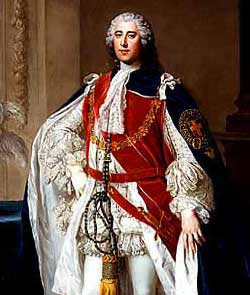Sir Henry Clinton and his friends
Sir Henry Clinton was the only son of Admiral the Hon. George Clinton, governor of Newfoundland from 1732-1741 and of New York from 1741-1751. Sir Henry was brought up in America, and possessed estates in New York State up till the War of Independence.
His military career began in the Independent New York companies, but when his father returned to England in 1751 he was gazetted a lieutenant in the 2nd Foot Guards, and in 1758 became a captain in the 1st Foot Guards. He served during the Seven Years War as aide de camp to the hereditary Prince of Brunswick, and was wounded at Johannisberg in 1762. He finished the war as Colonel of the 12th Regiment of Foot and it was about this time that he made the close acquaintance of his cousin Henry, 2nd Duke of Newcastle.

Portrait of Henry F.C. Pelham-Clinton, 2nd Duke of Newcastle under Lyne, by William Hoare c.1755
In 1767 Clinton married Harriet Carter, the marriage producing two sons, both of whom later had distinguished military careers. In 1772 Sir Henry was promoted Major-General, but his wife died. He was grief-stricken, and Newcastle suggested that Sir Henry accompany his two sons Lords Thomas and John Pelham Clinton on a tour of the continent. This journey took the party through Austria and the lower Danube where they observed the war between Russia and Turkey, in what is now Bulgaria. Many of the ideas which Sir Henry was to use in America derived from his observations of the Russian Army.
Henry, 2nd Duke of Newcastle, was the nephew of the great Whig political manager, but lacked both the ruthlessness and skill necessary to maintain his uncle's role in Parliament. Sir Henry Clinton saw his cousin's role as protecting him against his political opponents, and in this, particularly after 1781, Newcastle was so unsuccessful that it caused a rift between them in 1784.
Charles Mellish M.P., of Blyth in Nottinghamshire, was a lawyer, West India merchant and financier, brother-in-law to the 2nd Viscount Galway, who managed the Galway interest in Nottinghamshire and Yorkshire in favour of Newcastle. He was a longstanding friend and financial adviser to Sir Henry Clinton, and a man with extensive connections in America among the merchants of Philadelphia and Charlestown. Among his correspondents was Dr. John McNamara Hayes, a physician attached to General Burgoyne's army in Canada, who later became personal physician to Sir Henry Clinton and Inspector-General of hospitals during the Southern Campaign. Hayes' vivid description of part of the Northern Campaign has been included here, although most of the other letters are from Clinton to Newcastle or Mellish.
Attitude of this group towards America
The correspondence and speeches made in Parliament by this group show that their attitude towards America was conciliatory and moderate, though the American Congress might have described it differently. Like most of their English contemporaries they did not believe that America could be independent and united, because the needs and development of the individual colonies were so varied and at times contradictory. In a parliamentary speech in 1775 Charles Mellish stated quite categorically that George III's government had seriously mishandled the American business, and that all duties and Parliamentary impositions should be withdrawn. Each colony was then to advance towards independence in its own time without reference to the others. Basic to both General William Howe's and Sir Henry Clinton's attitude to America was the firm conviction that no matter how often the American colonists were beaten in battle the basic problem remained unsolved, and could only be solved by negotiation.
This was not an attitude likely to be favoured by the British government, who believed that a military solution was both possible and desirable. Sir Henry Clinton believed that the War would be one of attrition, in which Congress would be brought to its senses by bankruptcy. The element missing from this calculation was the entry of the French into the war in 1778, which converted a local difficulty (from the British point of view) into a conflict fought across the globe.
Like most British commanders Sir Henry Clinton was at first over-optimistic about the strength of support which Britain had in America among Americans. In a letter of autumn 1775 to Charles Mellish he advocated a campaign in New York and Virginia on the grounds that Britain had friends there. It was Charles Mellish in England who had to advise caution:
…I attend much to your state of America, but fear that the southern provinces are not so passive as you think. I am guardian to a young man Mr. Anthony Butler, who is bound to a considerable merchant in Philadelphia; I have written to him to come over; for I find Mifflin is gone to the provincial camp as Major & I fancy aide de camp to one of their self-born generals, & the young men of Philadelphia are all exercising. As to Virginia Major Gates has come from the back settlements as adjutant, which he would scarce have done had not the bulk of Virginia been against us. The Carolinas are in possession of the mob, Nova Scotia alone is dutiful. I enclose their address to the crown…
Charles Mellish to Sir Henry Clinton, 10 September 1775, Clinton Papers, William L. Clements Library, Ann Arbor, Michigan
Next page: The Battle of Bunker Hill, 1775